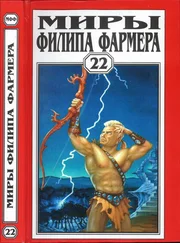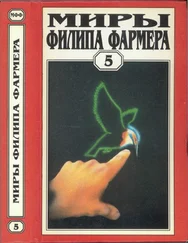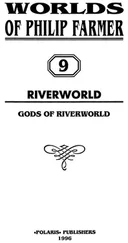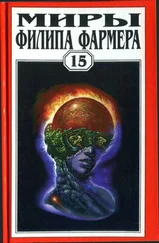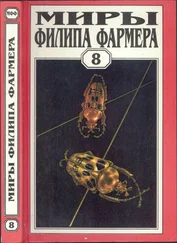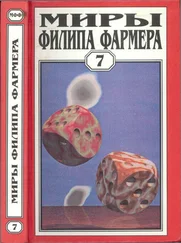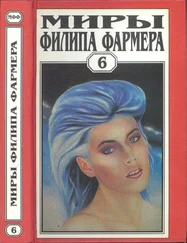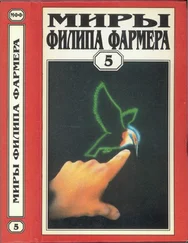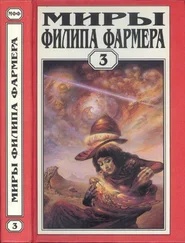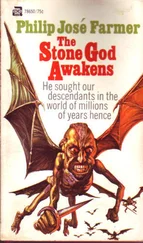Филип Фармер - The Lovers
Здесь есть возможность читать онлайн «Филип Фармер - The Lovers» весь текст электронной книги совершенно бесплатно (целиком полную версию без сокращений). В некоторых случаях можно слушать аудио, скачать через торрент в формате fb2 и присутствует краткое содержание. Жанр: Фантастика и фэнтези, на английском языке. Описание произведения, (предисловие) а так же отзывы посетителей доступны на портале библиотеки ЛибКат.
- Название:The Lovers
- Автор:
- Жанр:
- Год:неизвестен
- ISBN:нет данных
- Рейтинг книги:5 / 5. Голосов: 1
-
Избранное:Добавить в избранное
- Отзывы:
-
Ваша оценка:
- 100
- 1
- 2
- 3
- 4
- 5
The Lovers: краткое содержание, описание и аннотация
Предлагаем к чтению аннотацию, описание, краткое содержание или предисловие (зависит от того, что написал сам автор книги «The Lovers»). Если вы не нашли необходимую информацию о книге — напишите в комментариях, мы постараемся отыскать её.
The Lovers — читать онлайн бесплатно полную книгу (весь текст) целиком
Ниже представлен текст книги, разбитый по страницам. Система сохранения места последней прочитанной страницы, позволяет с удобством читать онлайн бесплатно книгу «The Lovers», без необходимости каждый раз заново искать на чём Вы остановились. Поставьте закладку, и сможете в любой момент перейти на страницу, на которой закончили чтение.
Интервал:
Закладка:
He started to bury his face against her shoulder, but she put both hands on his chest and with surprising strength, half-raised him.
'No. I must see your face. Especially at the time I must, for I want to see you lose yourself in me.'
And she kept her eyes wide open throughout as if she were trying to impress forever upon every cell of her body her lover's face.
Hal was not disconcerted, for he would not have paid attention to the Archurielite himself knocking on the door. But he noticed, though he did not think of it, that the pupils of her eyes had contracted to a pencil point.
The Alcoholics in the Haijac Union were sent to H. Therefore, no psychological or narcotic therapies had been worked out for addicts. Hal, frustrated by this fact in his desire to wipe out Jeannette's weakness, went for medicine to the very people who had given her the disease. But he pretended that the cure was for himself.
Fobo said, 'There is widespread drinking on Ozagen, but it is light. Our few alcoholics are empathized into normality with the help of medicine, of course. Why don't you let me empathize you?'
'Sorry. My government forbids that.'
He had given Fobo the same excuse for not inviting the wog into his apartment.
'You have the most forbidding government,' said Fobo and went into one of his long, howling laughs.
When he recovered, he said, 'You're forbidden to touch liquor, too, but that doesn't hold you back. Well, there's no accounting for inconsistency. Seriously, though, I have just the thing for you. It's called Easyglow. We put it into the daily ration of liquor, slowly increasing the Easyglow and diminishing the alcohol. In two or three weeks, the patient is drinking from a fluid ninety-six percent Easyglow. The taste is much the same; the drinker seldom suspects. Continued treatment eases the patient from his dependence on the alcohol. There is only one drawback.'
He paused and said, 'The drinker is now addicted to Easyglow!'
He whooped and slapped his thigh and shook his head until his long cartilaginous nose vibrated, and laughed until the tears came.
When he managed to quit laughing and had dried his tears with a starfish-shaped handkerchief, he said, 'Really, the perculiar effect of Easyglow is that it opens the patient for discharge of the strains that have driven him to drink. He may then be empathized and at the same time weaned from the stimulant. Since I have no opportunity to slip the stuff to you secretly, I'm taking the chance that you are seriously interested in curing yourself. When you're ready for therapy, tell me.'
Hal took the bottle to his apartment. Every day, its contents went quietly and carefully into the beetlejuice he got for Jeannette. He hoped that he was psychologist enough to cure her once the Easyglow took effect.
Although he didn't know it, he was himself being 'cured' by Fobo. His almost daily talks with the empathist instilled doubts about the religion and science of the Haijacs. Fobo read the biographies of Isaac Sigmen and the Worfo: the Pre-Torah, The Western Talmud, the Revised Scriptures, the Foundations of Serialism, Time and Theology, The Self and the World Line. Calmly sitting at his table with a glass of juice in his hand, the wog challenged the mathematics of the dunnologists. Hal proved; Fobo disproved. He pointed out that the mathematics was based mainly on false-to-fact assumptions; that Dunne's and Sigmen's reasoning was buttressed by too many false analogies, metaphors, and strained interpretations. Remove the buttresses, and the structure fell.
'Moreover and to continue,' Fobo said, 'allow and permit me to point out one more in a score of contradictions embodied in your theology. You Sigmenites believe that every person is responsible for any event happening to him, that no one else but the self may be blamed. If you, Hal Yarrow, stumbled on a toy left by some careless child – happy, happy infant with no responsibilities! – and skinned your elbow, you did so because you really wanted to hurt yourself. If you are seriously hurt in an 'accident,' it was no accident; it was you agreeing to actualize a potentiality. Contrarily, you could have agreed with your self not to be involved, and so actualized a different future.
'If you commit a crime, you wish to do so. If you get caught, it is not because you were stupid in the commission of the crime or because the Uzzites were more clever or because circumstances worked out to make you fall into the hands of – what is your vernacular for them, the uzz? No, it was because you wished to be caught; you, somehow, controlled the circumstances.
'If you die, it is because you wanted to die, not because someone pointed a gun at you and pulled the trigger. You died because you willed to intercept the bullet; you agreed with the killer that you could be killed.
'Of course, this philosophy, this belief, is very shib for the Sturch, for it relieves them of any blame if they have to chastise or execute or unjustly tax you or in any way take uncivil liberties with you. Obviously, if you did not wish to be chastised or executed or taxed or dealt with in an unfair way, you would not permit it.
'Of course, if you do disagree with the Sturch or try to defy it, you do so because you are trying to realize a pseudofuture, one condemned by the Sturch. You, the individual, can't win.
'Yet, hear and listen to this: You also believe that you yourself have perfect free will to determine the future. But the future has been determined because Sigmen had gone ahead in time and arranged it. Sigmen's brother, Jude Changer, may temporarily disarrange the future and the past, but Sigmen will eventually restore the desired equilibrium.
'Let me ask and question you, how can you yourself determine the future when the future has been determined and forecast by Sigmen? One state or the other may be correct, but not both.'
'Well,' Hal said, his face hot, his chest feeling as if a heavy weight were on it, his hands shaking, 'I have thought of that very question.'
'Did you ask anyone?'
'No,' Hal said, feeling trapped. 'We were allowed to ask questions, of course, of our teachers. But that question was not on the list.'
'You mean to tell me that your questions were written out for you and you were confined to those?'
'Well, why not?' Hal said angrily. 'Those questions were for our benefit. The Sturch knew from long experience what questions students ask, so it listed them for the less bright.'
'Less bright is right,' said Fobo. 'And I suppose that any questions not on the list were considered too dangerous, too conducive to unrealistic thinking?'
Hal nodded miserably.
Fobo went on in his relentless dissection. Worse, far worse than anything he had said were his next words, for they were a personal attack on the sacrosanct self of Sigmen himself.
He said that the Forerunner's biographies and theological writings revealed him to an objective reader as a sexually frigid and woman-hating man with a Messiah complex and paranoid and schizophrenic tendencies which burst through his icy shell from time to time in religious-scientific frenzies and fantasies.
'Other men,' Fobo said, 'must have stamped their personalities and ideas upon their times. But Sigmen had and advantage over those great leaders who came before him. Because of Earth's rejuvenation serums, he lived long enough, not only to set up his kind of society, but also to consolidate it and weed out its weaknesses. He didn't die until the cement of his social form had hardened.'
'But the Forerunner didn't die,' Yarrow protested. 'He left in time. He is still with us, traveling down the fields of presentation, skipping here and there, now to the past, now to the future. Always, whereever he is needed to turn pseudotime into real time, he is there.'
Читать дальшеИнтервал:
Закладка:
Похожие книги на «The Lovers»
Представляем Вашему вниманию похожие книги на «The Lovers» списком для выбора. Мы отобрали схожую по названию и смыслу литературу в надежде предоставить читателям больше вариантов отыскать новые, интересные, ещё непрочитанные произведения.
Обсуждение, отзывы о книге «The Lovers» и просто собственные мнения читателей. Оставьте ваши комментарии, напишите, что Вы думаете о произведении, его смысле или главных героях. Укажите что конкретно понравилось, а что нет, и почему Вы так считаете.

